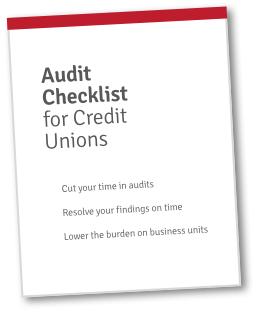Depending on who your auditors are—or what type of audit they’re conducting—your auditors could be looking for any number of things.
One thing they’re always looking for? Consistency.
If there’s one thing that credit unions are familiar with, it’s audits. And, if there’s a second thing that credit unions are familiar with, it’s their auditor’s expectations. (Or at least, we hope credit unions are familiar with auditor expectations—auditors do tend to write up a handy document request list.)
Still, each auditor—and each kind of audit—is going to come with a new set of expectations, needs, questions, and so on.
Fortunately, this is one of the areas where consistency really shines. But don’t worry—we have a couple ideas about how to guarantee better consistency. First, a little about why consistency is key. Then, some suggestions about how to achieve it.
Why Consistency Matters to Credit Union Audit Teams
Credit union audit teams are brave souls who dedicate their time to ensuring proper financial practices, operations, and so on in a given credit union. Some are employed full time for auditing purposes. Others carve out time from their already-busy schedules to take part.
And they get good at audits. They have to. They deliver the goods, day in and day out, month after month, year after year.
Of course, the expectation of them is that they succeed. Their supervisory committee, their auditors, any relevant regulatory bodies—they’re all expecting accurate, timely results that demonstrate the credit union’s commitment to compliance.
Now, regulations change frequently. The financial landscape is constantly beset by disruption. Nevertheless, credit unions and their audit teams have to show that they’re on top of their game. That takes consistency.
But here’s the tangible importance of consistency:
Credit union audit teams must deliver consistent answers in their audits. If they don’t, they risk piquing their auditors’ interest, and generally in a bad way.
Inconsistency in audits leads to things like repeat findings and answers that don’t align (or worse, that contradict each other). Nobody wants to explain that to an auditor!
Why Consistency Matters to Your Auditors
Auditors are no strangers to consistency, either. Your auditors will want to make sure that your credit union is still following all the rules.
Sure, they won’t mind if you make a few improvements here and there. But they might look twice—a very critical second look—if they see a significant change from one year to the next.
While sticking to the script and being predictable can sound boring for many of life’s activities, it’s a boon for audits.
How Credit Unions Can Increase Consistency in Their Audits
So, if you want to keep your credit union auditors happy, you need to prioritize consistency.
Here are a couple tips about how to improve your credit union’s audit consistency:
First, think about where you keep your audit documents, past and present.
- Are they all in one place?
- Are they easy to find and access?
- Is there a standardized filing structure?
- Is anything lost or missing?
- Do you store communications?
- Do you maintain a robust audit trail for each audit?
If you know where you can find all of your audit documents, reports, communications, findings, and so on for your past audits, then you’re in great shape.
However, if you answered “no” to any of the above, then you have some work to do!
In the event that you’re ever asked a question that you’ve already answered, a consistent filing and archival structure can help you quickly find the resources you need. You can leverage the past to make quick work of the present.
Plus, having good access to older and ongoing audits can help you keep things straight. Audits and audit tails that span months—or years!—introduce new risks to credit unions. For one, staff turnover comes to mind. Also, longer audit processes mean more time to lose track of items, forget things, or otherwise let important items slip through the cracks.
Failure to archive, organize, and leverage the past increases your risk of inconsistent answers, repeat findings, and unhappy credit union auditors.
Whether you devote time or personnel to storing data, or if your sophisticated credit union audit software automates that, you’ll have an easier time with future audits if you can leverage your past.
Other Benefits to Consistency
Consistency doesn’t just help your credit union reference older audit answers or findings—it also helps your team optimize their process.
Most people don’t like to be asked to perform a different task every day. It can be demoralizing for employees to feel that they must constantly change their tactics (or roles) to do their jobs.
Consistency in the audit process boosts an audit team’s confidence. They’ll enter each audit knowing that they can do it, that they can do it well, and that they can trust each other to deliver.
That confidence afforded them by consistency often leads to:
- Better audit results
- Satisfied employees
- Fewer sleepless nights
Sometimes, in audits as with life, knowing where you’ve been can you know where you’re going.

FREE: Audit Checklist for Credit Unions
4 key principles and 9 questions to jumpstart your audit planning. From leading credit unions.Further Reading
If you’d like to see more credit union audit resources, follow the links below! Or, if you’re preparing for an audit now, feel free to download our credit union audit checklist.
HOW THE NCUA AIRES QUESTIONNAIRES CAN HELP YOUR CREDIT UNION PREPARE FOR YOUR NEXT REGULATORY EXAMINATION
THE HIDDEN RISKS IN CREDIT UNION REGULATORY EXAMINATIONS — AND HOW TO AVOID THEM





